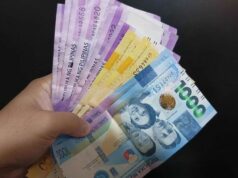Press freedom hero Luis Teodoro writes 30
 THERE is trembling as I write this piece. I have this once-in-a-lifetime opportunity to stand in for an icon, and I cannot fail his followers. I should not fail him. I can almost imagine Dean Luis V. Teodoro standing behind my back, looking at what I am encoding, and then saying “O, husayan mo ah.” (“Make it good.”)
THERE is trembling as I write this piece. I have this once-in-a-lifetime opportunity to stand in for an icon, and I cannot fail his followers. I should not fail him. I can almost imagine Dean Luis V. Teodoro standing behind my back, looking at what I am encoding, and then saying “O, husayan mo ah.” (“Make it good.”)
Teodoro was passionate about everything he did for and about journalism. Three days since his passing, anecdotes about his strictness and generosity in class have surfaced. These heart-warming stories were from Teodoro’s students from the 1960s until this current semester. The variety of such recollection spans six decades but they are consistent in their messages: that Teodoro was both strict in making sure his students did their work based on journalism standards, and generous in sharing his knowledge, skills, and practical examples based on his experiences in the newsroom.
To say that Teodoro loved teaching journalism is an understatement. Teaching journalism and media ethics energized him. It breathed a sense of assurance that there is hope for the future of Philippine journalism.
He wrote in 2006: “Many of the students I have had are today in the media professions as reporters, editors, researchers, feature writers, etc. While some may be faulted for professional or ethical failings, or both, in general the education they received at UP (University of the Philippines) seems to have made them into the responsible professionals both the country and Philippine journalism need. It’s compensation enough for this longtime teacher of journalism.”
Teodoro’s friends and colleagues have likewise talked about his revered presence in many media events and milestones; his contributions — whether through wise guidance or expansive networking — in initiating press freedom advocacy projects; and his notoriety as a seasoned editor. Aside from all these, Teodoro was a sharp and widely followed columnist. He wrote columns for the Manila Times, Today, Manila Standard Today, and BusinessMirror. At the time of his death, he was a columnist for BusinessWorld.
Teodoro was widely read and always abreast with current national and international socio-political events. The depth of his knowledge on political issues and their impact on societies was simply stunning. This is evident in the wide range of topics that he discussed in his columns. As a columnist, he was very particular with the accuracy of his facts. This I knew very well and early on.
Until now, I clearly remember that one afternoon when he came to the classroom very, very upset. He was our professor in Journalism 101. We spent more than 30 minutes of the class listening to him as he ranted over a typographical error in a figure that he mentioned in his column. He was discussing a controversial issue about overseas Filipino workers and the column showed an erroneous figure on OFW remittances. During those days, columns were faxed to the newsrooms and were encoded before layout. The encoder apparently typed a wrong number. Using his column for that day which had an error, he discussed in class the value of accuracy in journalism. Years later, when he was my editor for the Philippine Journalism Review, I would hear him every once-in-a-while calling government agencies to verify data or figures he read in the newspapers. He taught accuracy in reporting; he practiced it himself.
I believe that he enjoyed writing his weekly column — despite the stress of deadlines — because it was an opportunity to provide information and analyses for a more informed and, hopefully, better citizenry. Whenever he was very passionate about a topic that he wrote, he would send a text saying, “Have you read BWorld?” I then would know what he meant; he wanted me to read his column.
On accuracy for democratization, he once wrote: “If inaccurate reporting can escalate war rhetoric, endanger peace processes, and even set off a chain of events that can lead to actual conflict, on the other hand, accuracy can help a community acquire the understanding of events and their contextualization critical to democratization. A report that gets the names, places, and dates right, and at the same time provides background and explanation can do wonders in empowering a community towards making it aware not only of the dimensions of its problems, but also of the possibilities for its solutions.”
He was always sharp. His columns made his readers think.
Teodoro’s vantage point on socio-political issues shall be terribly missed. He leaves a space that is difficult to fill in. It is heart-breaking to write: Press freedom hero Luis Teodoro writes 30.
Evelyn O. Katigbak was a student of the late Luis V. Teodoro at the University of the Philippines. She also worked with Teodoro at the Center for Media Freedom and Responsibility, and later at the UP College of Mass Communication.



